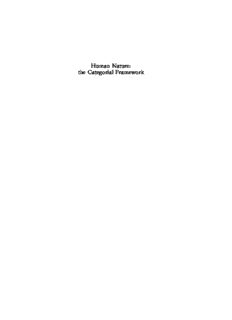
Human Nature: The Categorial Framework PDF
Preview Human Nature: The Categorial Framework
HNA01 27/03/2007 12:29PM Page i Human Nature: the Categorial Framework HNA01 27/03/2007 12:29PM Page ii HNA01 27/03/2007 12:29PM Page iii Human Nature: the Categorial Framework P. M. S. Hacker Fellow of St John’s College · Oxford HNA01 27/03/2007 12:29PM Page iv © 2007 by P. M. S. Hacker blackwell publishing 350 Main Street, Malden, MA 02148-5020, USA 9600 Garsington Road, Oxford OX4 2DQ, UK 550 Swanston Street, Carlton, Victoria 3053, Australia The right of P. M. S. Hacker to be identified as the Author of this Work has been asserted in accordance with the UK Copyright, Designs, and Patents Act 1988. All rights reserved. No part of this publication may be reproduced, stored in a retrieval system, or transmitted, in any form or by any means, electronic, mechanical, photocopying, recording or otherwise, except as permitted by the UK Copyright, Designs, and Patents Act 1988, without the prior permission of the publisher. First published 2007 by Blackwell Publishing Ltd 1 2007 Library of Congress Cataloging-in-Publication Data Hacker, P. M. S. (Peter Michael Stephan) Human nature : the categorial framework / P. M.S. Hacker. p. cm. Includes bibliographical references and index. ISBN 978-1-4051-4728-6 (hardback : alk. paper) 1. Philosophical anthropology. I. Title. BD450.H2355 2007 128—dc22 2006103171 A catalogue record for this title is available from the British Library. Set in 10.5/12.5pt Sabon by Graphicraft Limited, Hong Kong Printed and bound in Singapore by Markono Print Media Ltd The publisher’s policy is to use permanent paper from mills that operate a sustainable forestry policy, and which has been manufactured from pulp processed using acid-free and elementary chlorine-free practices. Furthermore, the publisher ensures that the text paper and cover board used have met acceptable environmental accreditation standards. For further information on Blackwell Publishing, visit our website: www.blackwellpublishing.com HNA01 27/03/2007 12:29PM Page v For Hans Oberdiek HNA01 27/03/2007 12:29PM Page vi HNA01 24/04/2007 03:20PM Page vii Contents Preface xi Chapter 1 The Project 1 1. Human nature 1 2. Philosophical anthropology 4 3. Grammatical investigation 7 4. Philosophical investigation 11 5. Philosophy and ‘mere words’ 14 6. A challenge to the autonomy of the philosophical enterprise: Quine 17 7. The Platonic and Aristotelian traditions in philosophical anthropology 21 Chapter 2 Substance 29 1. Substances: things 29 2. Substances: stuffs 34 3. Substance-referring expressions 37 4. Conceptual connections between things and stuffs 42 5. Substances and their substantial parts 44 6. Substances conceived as natural kinds 45 7. Substances conceived as a common logico-linguistic category 49 8. A historical digression: misconceptions of the category of substance 51 HNA01 24/04/2007 03:20PM Page viii viii Contents Chapter 3 Causation 57 1. Causation: Humean, neo-Humean and anti-Humean 57 2. On causal necessity 62 3. Event causation is not a prototype 65 4. The inadequacy of Hume’s analysis: observability, spatio-temporal relations and regularity 69 5. The flaw in the early modern debate 73 6. Agent causation as prototype 75 7. Agent causation is only a prototype 80 8. Event causation and other centres of variation 82 9. Overview 88 Chapter 4 Powers 90 1. Possibility 90 2. Powers of the inanimate 93 3. Active and passive powers of the inanimate 96 4. Power and its actualization 98 5. Power and its vehicle 103 6. First- and second-order powers; loss of power 105 7. Human powers: basic distinctions 106 8. Human powers: further distinctions 114 9. Dispositions 118 Chapter 5 Agency 122 1. Inanimate agents 122 2. Inanimate needs 128 3. Animate agents: needs and wants 130 4. Volitional agency: preliminaries 137 5. Doings, acts and actions 140 6. Human agency and action 144 7. A historical overview 146 8. Human action as agential causation of movement 153 Chapter 6 Teleology and Teleological Explanation 161 1. Teleology and purpose 161 2. What things have a purpose? 169 3. Purpose and axiology 175 4. The beneficial 180 5. A historical digression: teleology and causality 181 HNA01 24/04/2007 03:20PM Page ix Contents ix Chapter 7 Reasons and Explanation of Human Action 199 1. Rationality and reasonableness 199 2. Reason, reasoning and reasons 203 3. Explaining human behaviour 210 4. Explanation in terms of agential reasons 220 5. Causal mythologies 226 Chapter 8 The Mind 233 1. Homo loquens 233 2. The Cartesian mind 240 3. The nature of the mind 248 Chapter 9 The Self and the Body 257 1. The emergence of the philosophers’ self 257 2. The illusion of the philosophers’ self 261 3. The body 268 4. The relationship between human beings and their bodies 276 Chapter 10 The Person 285 1. The emergence of the concept 285 2. An unholy trinity: Descartes, Locke and Hume 289 3. Changing bodies and switching brains: puzzle cases and red herrings 301 4. The concept of a person 310 Index 317 HNA01 24/04/2007 03:20PM Page x
Description: